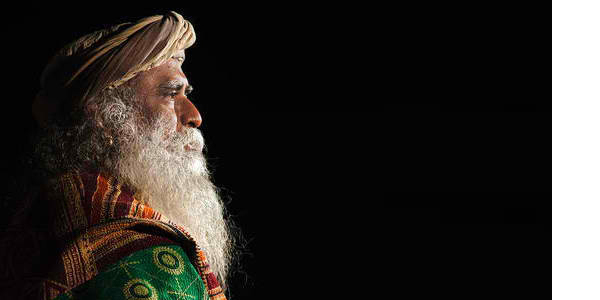Mahabharat Episode 39: Yudhishthira Answers the Yaksha’s Questions

“The most amazing thing is, though humans are mortal, everybody goes about their life as if they are going to be here forever.”
—Sadhguru
What happened so far: The forest exile is coming to a close and Bhima had become angry and bitter after going through this hardship. A beautiful incident unfolds where Hanuman himself comes to teach Bhima a lesson in humility.
Sadhguru: On a certain day, when the Pandavas were out hunting in the forest, they got a little thirsty and tired. At that time, a Brahmana came running to them and said that for his worship, he had hung out some sacred grass to dry. A male deer passed by, the grass got caught in its antlers, and the buck ran away into the forest with the grass. He pleads with the Pandavas, “Please, somehow get this sacred grass for me, because it’s time for my worship. I don’t want to miss this worship. You’re supposed to be brave Kshatriyas; you must help me.”
Yudhishthira asks his brothers to go in different directions to search for the deer. They don’t see the deer anywhere. At some point, they are exhausted and thirsty. Yudhishthira asks Nakula to go and look for water. At some point, Nakula comes to a pond. As he is about to drink from the water, a voice says, “Don’t drink from this water before you answer my questions.” Nakula ignores it, drinks the water, and falls dead.
When Nakula doesn’t return, Yudhishthira sends Sahadeva to look for him. As Sahadeva comes near the pond, a voice says, “Wait! Do not drink from this water before answering my questions.” Sahadeva says, “Let me quench my thirst first. Then I shall answer your questions.” He drinks the water and falls dead. Now Yudhishthira senses that the two brothers are in danger, and he asks Bhima and Arjuna to look for them. They come to the pond. As they are about to drink from it, a voice says, “Wait! Do not drink from this water before answering my questions.” Arjuna says, “Who are you? Show yourself.” Bhima says, “Leave it, Arjuna. Let’s drink the water.” They both drink the water and fall dead.
When even Bhima and Arjuna don’t return, Yudhishthira goes in search of them. Eventually, he comes to the pond and sees his brothers lying there, dead. He asks the pond, “Water! Are you the culprit? Are you the one who took my brothers’ lives? Take mine too!” A voice says, “Stop! Do not drink the water before answering my questions.” Yudhishthira asks, “Who are you? Where are you? Show yourself.”
A Yaksha appears and says, “This pond belongs to me. Your brothers died because they drank from its waters before answering my questions. Do you wish to suffer the same fate?” Yudhishthira said, “I do not wish to take what does not belong to me. Ask me your questions, and I’ll answer them as best as I can.”
Question: What is more important than the earth itself?
Yudhishthira: One’s mother.
Question: What is higher than heaven?
Yudhishthira: One’s father.
Question: What is swifter than the wind?
Yudhishthira: The mind.
Question: More numerous than the blades of grass?
Yudhishthira: The thoughts in the mind.
Question: What is the highest sanctuary of dharma?
Yudhishthira: Liberality.
Question: What is the highest sanctuary of fame?
Yudhishthira: A gift.
Question: Of heaven?
Yudhishthira: The truth.
Question: What is the most praiseworthy thing of all?
Yudhishthira: Skill.
Question: The most valuable possession?
Yudhishthira: Knowledge.
Question: The greatest treasure?
Yudhishthira: Health.
Question: The greatest happiness?
Yudhishthira: Contentment.
Question: What is the highest dharma?
Yudhishthira: To injure none of the living.
Question: What must be controlled?
Yudhishthira: The mind.
Question: What must be renounced to make a man agreeable?
Yudhishthira: Pride.
Question: What must be renounced to make a man wealthy?
Yudhishthira: Desire.
Question: And what can be renounced without regret?
Yudhishthira: Anger.
Question: And what will be relinquished to gain happiness?
Yudhishthira: Greed.
Question: What makes the way?
Yudhishthira: The good make the way, indeed they are the way.
Question: Who is the ascetic?
Yudhishthira: He who remains faithful.
Question: What is true restraint?
Yudhishthira: That of the mind.
Question: And what is true forgiveness?
Yudhishthira: He who endures enmity truly forgives.
Question: What is real knowledge?
Yudhishthira: The knowledge of god.
Question: What is tranquility?
Yudhishthira: When the heart is still.
Question: What is mercy?
Yudhishthira: When one desires the happiness of all creatures.
Question: What is simplicity?
Yudhishthira: When the heart is tranquil.
Question: What is the invincible enemy?
Yudhishthira: Anger.
Question: What disease has no cure?
Yudhishthira: Covetousness.
Question: What is the honest man?
Yudhishthira: He who desires the happiness of all the living.
Question: And the dishonest one?
Yudhishthira: The one who has no mercy.
Question: What is ignorance?
Yudhishthira: Not knowing one’s Dharma.
Question: What is pride?
Yudhishthira: When a man thinks that he’s the one who is the doer of life.
Question: What is grief?
Yudhishthira: Only ignorance.
Question: How does a man become patient?
Yudhishthira: By subduing his senses.
Question: Which is the true ablution?
Yudhishthira: When the heart is washed clean.
Question: What is charity?
Yudhishthira: Protecting all creatures.
Question: What is wickedness?
Yudhishthira: Speaking ill of others.
Question: How is a man agreeable?
Yudhishthira: When he speaks agreeably.
Question: How does he get what he wants?
Yudhishthira: When he acts with discernment.
Question: And how do you find bliss in the next world?
Yudhishthira: By being virtuous in this one.
Question: What is truly amazing in this world?
Yudhishthira: The most amazing thing is, though humans are mortal, everybody goes about their life as if they are going to be here forever.
Question: What is the news? Who is the real man?
Yudhishthira: The word of one’s good deeds reach heaven and is spread from there across the earth. As long as that word lasts, one is called a man.
Question: Who is he, Yudhishthira, who has every kind of wealth?
Yudhishthira: Only he to whom joy and sorrow, fortune and misfortune, past and future are all the same.
Yaksha: Yudhishthira, you are the wisest man in the world and the most righteous one too. I grant you a boon. Ask me for the life of any one of your brothers.
Yudhishthira (after pondering for a while): Give me Nakula.
Yaksha: I am surprised. I know Bhima is dearest to you among all your brothers. You depend on Arjuna to win the war that’s coming. Yet, you choose Nakula’s life over others. Why?
Yudhishthira: I have two mothers – Kunti and Madri. I, the son of Kunti, am alive. Surely, a son of Madri should also live.
Yaksha: Ah! You are a great soul indeed. Yudhishthira! I will never look upon another like you in all time. I grant you not just Nakula’s life, but the life of all your brothers.
The Yaksha revived all the brothers.
The Yaksha was Dharma, Yudhishthira’s father.
The significant aspect of this encounter with Yaksha is this: When Yudhishthira fell into the temptation of putting his brothers at stake during the game of dice, he put Nakula and Sahadeva at stake first. They were his stepbrothers – somewhere, he was ready to lose them. Now, after living in the forest, that wisdom blossomed in him that when it came to saving one of his brothers’ life, he chose Nakula. “One of Kunti’s sons – that’s me; I’m here. One of Madri’s sons should also live.” What this incident is trying to convey is how the Pandavas went through a transformation by living in the forest. These twelve years of forest were not a curse. They made them into much better human beings, to later on become much better kings. This was all Krishna’s game plan.
To be continued..
Editor’s Note: A version of this article was originally published in the Forest Flower magazine, March 2018.


